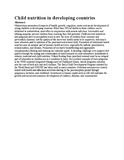| dc.contributor.author | Neumann, CG | |
| dc.contributor.author | Gewa, C | |
| dc.contributor.author | Bwibo, NO | |
| dc.date.accessioned | 2013-04-15T10:33:01Z | |
| dc.date.available | 2013-04-15T10:33:01Z | |
| dc.date.issued | 2004 | |
| dc.identifier.citation | Pediatr Ann. 2004 Oct;33(10):658-74 | en |
| dc.identifier.uri | http://www.ncbi.nlm.nih.gov/pubmed/15515353 | |
| dc.identifier.uri | http://erepository.uonbi.ac.ke:8080/xmlui/handle/123456789/15983 | |
| dc.description.abstract | Malnutrition permeates all aspects of health, growth, cognition, motor and social development of young children in developing countries. More than 50% of deaths in these children can be attributed to malnutrition, most often in conjunction with serious infection. Irreversible and lifelong sequelae prevent children from reaching their full potential. Child survival initiatives and programs have accomplished much to save the lives of children from common and preventable illnesses, but the quality of the survivors' health needs to be improved, with much more attention paid to nutrition of the preschool and school child. Promotion of nutritional health must become an integral part of primary health services, especially for infants, preschoolers, schoolchildren, and women. Promotion of exclusive breastfeeding and appropriate complementary feeding and weaning are essential inputs. A daunting challenge is to improve diet quality through the raising and consumption of small animals by rural subsistence households to enhance maternal and child nutrition. School feeding from preschool onward must be an integral part of education so children are in a condition to learn. An excellent example of such programs is the WHO initiated Integrated Management of Childhood Illness, which integrates nutrition into the care of both sick and well children. The Early Child Development Program initiated by the World Bank and UNICEF has taken hold in many countries. Nutrition outcomes are closely linked with health and education activities starting in the preconception period through pregnancy, lactation, and childhood. Investment in human capital early in life will optimize the growth and social and economic development of children, families, and communities | en |
| dc.language.iso | en | en |
| dc.title | Child nutrition in developing countries | en |
| dc.type | Article | en |
| local.publisher | Community Health Sciences and Pediatrics, University of California at Los Angeles | en |
| local.publisher | Schools of Public Health and Medicine, Los Angeles, CA 90095-1772, USA | en |
| local.publisher | Department of Paediatrics and Child Health, University of Nairobi | en |

